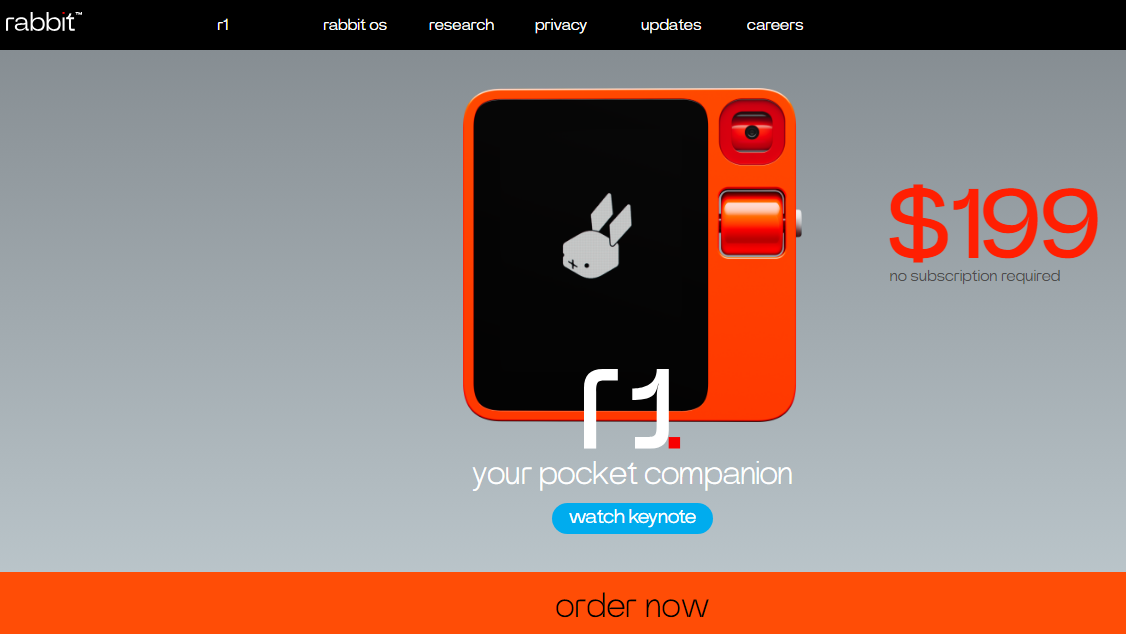The Rabbit R1 can perform various tasks without the need to open a dedicated app such as ordering food and looking up places.
Rabbit website
KEY POINTS
R1 doesn’t need a subscription and can be taught by the user to control apps
The standalone gadget’s design was made in collaboration with Teenage Engineering
R1 is now available in the US through Rabbit’s website
A standalone AI-powered pocket assistant, called Rabbit R1, grabbed everyone’s attention at CES 2024 on Tuesday. The handheld gadget, which measures about half the size of an iPhone, features an operating system built on Large Action Model (LAM) that helps it control multiple apps on the user’s behalf.
Unlike other AI devices that use a ChatGPT-like model, R1’s LAM is a new type of foundation model that understands human intentions, thus allowing users to teach the system how it can achieve targeted goals on apps.
$199, no subscription: https://t.co/R3sOtVVQTx #CES2024 pic.twitter.com/IFZ9ZC3F21
— rabbit inc. (@rabbit_hmi) January 9, 2024
Specs:
2.88-inch touch screen
2.3GHz MediaTek processor
4GB memory
128GB storage
Battery that “lasts all day”
Far-field mic
SIM slot
USB C charging
Design:
Push-to-talk button
Navigation wheel
Rounded body
Lightweight
Color:
Luminous Orange
Price:
Starts at $199 plus taxes and shipping fees
Availability:
In the U.S. through the Rabbit website
Will be available in Denmark, France, Germany, Ireland, Italy, Netherlands, Spain, Sweden, United Kingdom, Canada, South Korea and Japan later in 2024
The tasks Rabbit R1 can accomplish through a single interface include sending messages, buying groceries, looking up restaurants, searching for lodging options, and many more.
R1 doesn’t need a subscription, as is the case with Siri and other AI assistants, but a SIM card is necessary for internet connection. The device can be taught how to use apps through the ”watch what I’m doing” option.
The iPhone moment of this decade is here. The most powerful and capable AI hardware device was launched yesterday for $199 (₹ 17,000) 🤯
Rabbit R1 – a small orange box that fits in your palm can change how we use apps. Basically, make apps redundant. You won’t have to open Uber… pic.twitter.com/JLc0WxPM7x
— Rohan (@lets_dig_deeper) January 10, 2024
In his keynote speech, Jesse Lyu, CEO and founder of Rabbit, called the R1 a “ground-breaking consumer mobile device” that draws from the company’s mission of creating “the simplest computer, something so intuitive that you don’t need to learn how to use it.”
Introducing r1. Watch the keynote.
Order now: https://t.co/R3sOtVWoJ5 #CES2024 pic.twitter.com/niUmjFvKvE
— rabbit inc. (@rabbit_hmi) January 9, 2024
The most notable thing many observers pointed out about R1 was that it did not require the user to log in or open balancing apps on a mobile phone to deliver their request.
“We wanted to find a universal solution just like large language models. How can we find a universal solution to actually trigger our services, regardless of whether you’re a website or an app or whatever platform or desktop?” Lyu told The Verge.
Move over, Siri. The rabbit r1 is a pocket AI assistant that can navigate your apps for you, without you having to pick up your phone.
Check out our preview from #CES2024: https://t.co/R6naLv9ckH pic.twitter.com/aUbz0WW1xI
— TechCrunch (@TechCrunch) January 9, 2024
Several tech outlets have hailed the device’s assistance abilities without the need to use app-dedicated APIs (application programming interfaces). Others focused on the gadget’s “cute” and “adorable” design, which was designed in collaboration with Teenage Engineering, a Swedish consumer electronics company best known for the OP-1 portable synthesizer.
Rabbit raised $30 million in the fourth quarter of 2023. Among its investors were Synergis Capital, Kakao Investment and Khosla Ventures. It raised $20 million early in October.
Founded in 2013, the Los Angeles-based company believes its R1 can empower every user to contribute toward developing a safer and more powerful LAM that will, in turn, enhance the user experience.
CES 2024
2024-01-17 01:41:02
Original from www.ibtimes.com
